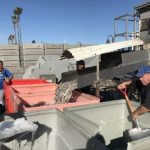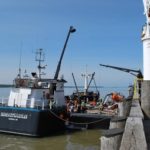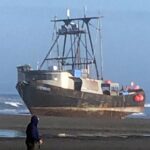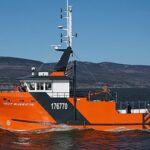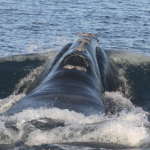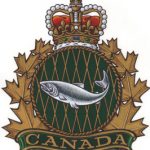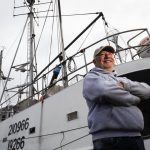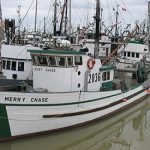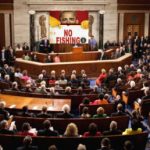Tag Archives: Virginia Institute of Marine Science
The Virginia Institute of Marine Science is researching the American eel in order to better understand what affects its numbers and to better manage the fishery.
![]() Every spring when baby eels drift into the Chesapeake Bay from the Atlantic, then swim like mad up tributary rivers and creeks toward fresh water, Troy Tuckey is waiting for them. continued@dailypress
Every spring when baby eels drift into the Chesapeake Bay from the Atlantic, then swim like mad up tributary rivers and creeks toward fresh water, Troy Tuckey is waiting for them. continued@dailypress
VIMS study: Dead zones bad for bay-bottom fishes, too
 Now researchers at the Virginia Institute of Marine Science, or VIMS, have completed an exhaustive 10-year study that they say provides the first quantitative evidence of the impacts on demersal fishes baywide. continued@dailypress
Now researchers at the Virginia Institute of Marine Science, or VIMS, have completed an exhaustive 10-year study that they say provides the first quantitative evidence of the impacts on demersal fishes baywide. continued@dailypress
New Virginia Institute of Marine Science study shows ‘dead zone’ impacts Chesapeake Bay fishes
The study, published in the May issue of Marine Ecology Progress Series, was authored by Andre Buchheister, a Ph.D. student in William & Mary’s School of Marine Science at VIMS, along with VIMS colleagues Chris Bonzek, Jim Gartlan d, and Dr. Rob Latour. Low-oxygen conditions—what scientists call “hypoxia”—form when excessive loads of nitrogen from fertilizers, sewage, and other sources feed algal blooms in coastal waters. [email protected]
d, and Dr. Rob Latour. Low-oxygen conditions—what scientists call “hypoxia”—form when excessive loads of nitrogen from fertilizers, sewage, and other sources feed algal blooms in coastal waters. [email protected]
Letter to the Editor: VIMS, VMRC caving to commercial interests – Dr. John B. Lapetina Sr., Port Haywood, Va.
Editor, Gazette-Journal: It is with great anguish that I write this letter. It is a letter that I feel in my heart I must write. The Chesapeake Bay is a great national treasure. It was named Chesapeake by the Indians, and it meant “Waters of Many Fish and Shellfish.” My generation and the next generation have just about over-harvested the bay until it is on the edge of its demise. continued
VIDEO: F S F Georges Bank Yellowtail Flounder and Incidental Catch Avoidance Forum (lots of information)
WASHING TON (Saving Seafood) Nov. 14, 2012 – Yesterday, the Fisheries Survival Fund, an industry group that includes the majority of full-time, limited-access scallop permit holders, hosted a forum, “Georges Bank Yellowtail Flounder and Incidental Catch Avoidance,” immediately following the New England Fisheries Management Council meeting in Newport, Rhode Island. Speakers at the event included Dr. Steve Cadrin and Cate O’Keefe of the School of Marine Science and Technology (SMAST) at the University of Massachusetts Dartmouth, Dr. David Rudders of the Virginia Institute of Marine Science, and Ron Smolowitz of Coonamessett Farms. http://campaign.r20.constantcontact.com/render?llr=b5nrgsdab&v=001aYDP54lNfT8w5naOyp7HRIgB4VG_lM4fDpTYpg49faLY5slnOWx7hp5-MTnG5BD5KPWh852FbmnbhXTHgUt6n45ny7Eyz5sx1B2fXOjmK-cdZ3Nh3VTYuw%3D%3D
TON (Saving Seafood) Nov. 14, 2012 – Yesterday, the Fisheries Survival Fund, an industry group that includes the majority of full-time, limited-access scallop permit holders, hosted a forum, “Georges Bank Yellowtail Flounder and Incidental Catch Avoidance,” immediately following the New England Fisheries Management Council meeting in Newport, Rhode Island. Speakers at the event included Dr. Steve Cadrin and Cate O’Keefe of the School of Marine Science and Technology (SMAST) at the University of Massachusetts Dartmouth, Dr. David Rudders of the Virginia Institute of Marine Science, and Ron Smolowitz of Coonamessett Farms. http://campaign.r20.constantcontact.com/render?llr=b5nrgsdab&v=001aYDP54lNfT8w5naOyp7HRIgB4VG_lM4fDpTYpg49faLY5slnOWx7hp5-MTnG5BD5KPWh852FbmnbhXTHgUt6n45ny7Eyz5sx1B2fXOjmK-cdZ3Nh3VTYuw%3D%3D

































